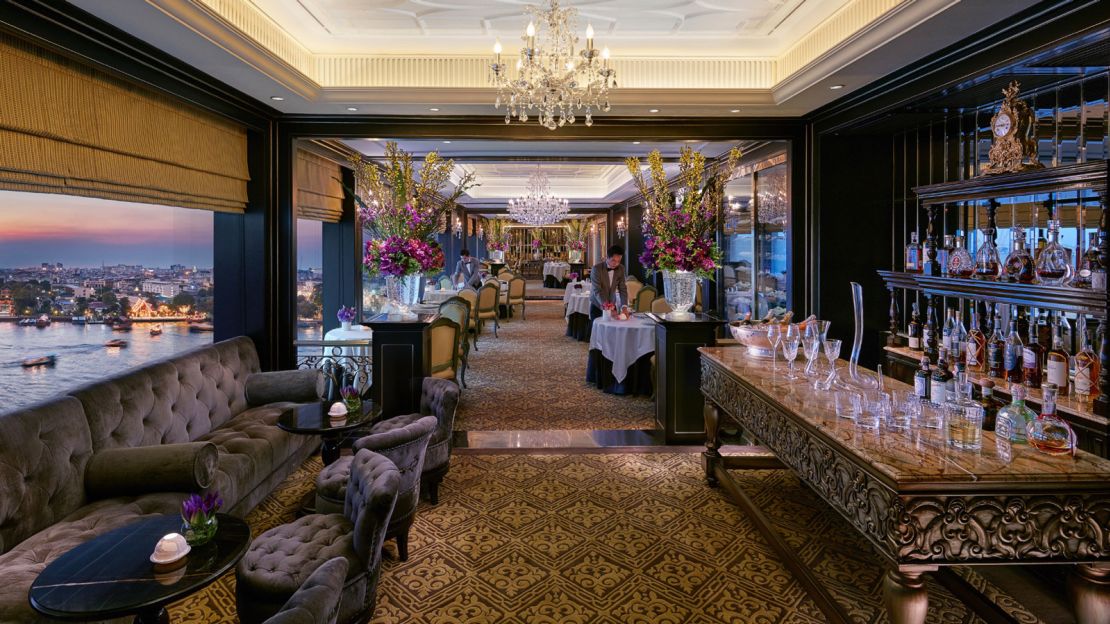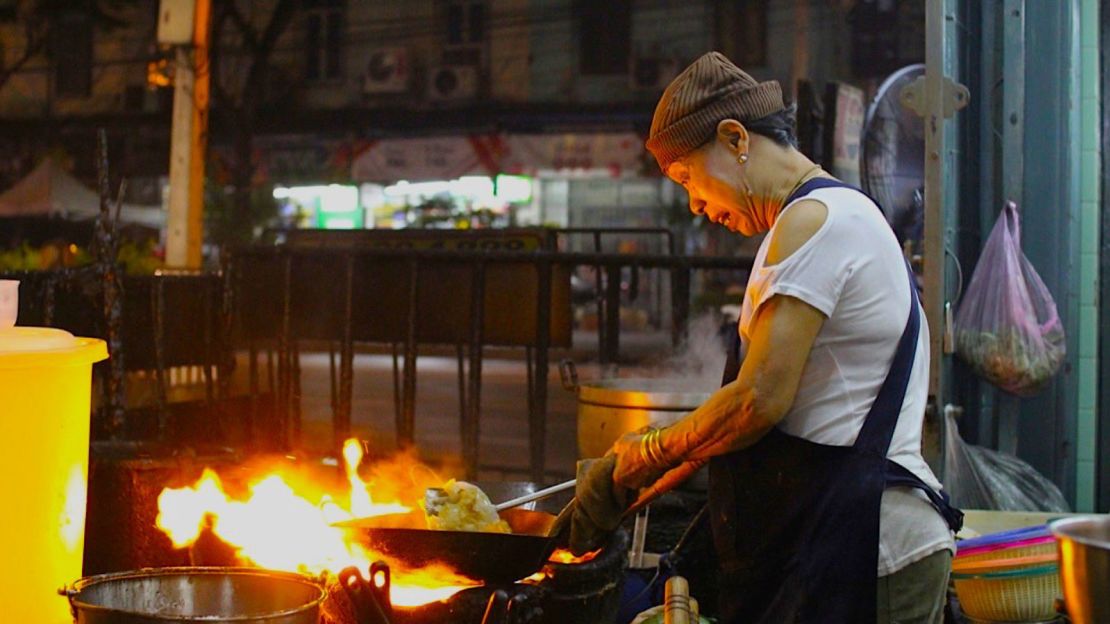Bangkok is no stranger to the Michelin Guide halo – in fact, visiting chefs touting their overseas star credentials are a regular sight in culinary establishments across the city.
Now it finally has a Michelin Guide of its own.
On December 6, 2017, the Bangkok culinary landscape became brighter overnight – 20 stars brighter to be exact – with Michelin accolades dished out to 17 establishments.
Among them is Jay Fai (named after the chef-owner of the street food shophouse restaurant who presides over her open kitchen wearing signature oversized goggles) who was awarded one Michelin star.
The highest accolade was two stars, which went to three establishments – the progressive Indian restaurant Gaggan, whose inclusion in any best-of Bangkok dining list should come as no surprise to anyone, Le Normandie which opened at the Mandarin Oriental Hotel Bangkok in 1958, and Mezzaluna at Lebua Hotel.
Already renowned as a street food destination, Bangkok – the seventh Asian territory to be rated by Michelin – has now risen up the culinary ranks to join the likes of Tokyo, Singapore and Hong Kong/Macau – even if the Tourism Authority of Thailand did have to dangle a reported 144 million Thai baht ($4.4 million) partnership to get them there.
“Michelin Guide elevates everything”

The winners of Michelin Guide Bangkok 2018 were announced in a gala dinner at Siam Kempinski Hotel Bangkok.
Following in the footsteps of Singapore, who was the first country globally to do so, the awards ceremony was complemented with a gala dinner open to the public.
Those who weren’t lucky enough to be invited to the Bangkok event had to shell out 20,000 Thai baht ($614) per ticket, which included a six-course gala dinner prepared in part by three chefs from overseas Michelin-starred restaurants.
Chef Chan Yan Tak from the three-starred Lung King Heen at Four Seasons Hotel Hong Kong, Thierry Marx from the two-starred Sur Mesure at Mandarin Oriental Paris, and Henrik Yde Andersen of one-starred Kiin Kiin in Copenhagen, the latter who “conceptualized” Siam Kempinski’s Sra Bua restaurant, all took part.
Other guest chefs included Thaninthorn Chantrawan of Chim by Siam Wisdom, Yannis J. Janssens of L’Atelier de Joel Robuchon Bangkok, Chayawee Sutcharitchan of Sra Bua by Kiin Kiin and Bee Satongun of Paste, each of which went on to receive one Michelin star.
The arrival of the Red Guide is considered a positive for the city by restaurateurs and chefs.
“The Michelin Guide elevates everything in one day,” said Gaggan’s chef Gaggan Anand, who earlier this year announced plans to close his restaurant in 2020 to focus on new projects.
“It changes Bangkok from the street food capital to the gourmet capital of the world.”
Melting pot of flavors

A variety of cuisines were represented on the night, including Thai, French, Indian, European, Japanese, German and American.
“Locals are having street food for lunch and fine dining for dinner, and depending on the mood you have a wide choice of cuisines,” said chef Thomas Sühring, one half of the duo behind contemporary German restaurant Sühring. “It is with this culinary scene that Bangkok is becoming one that can compete with other great cities in Asia.”
Over 15 years ago, Nahm at the Halkin Hotel in London put Thai food on the Michelin map when it was awarded one star not long after it opened in 2001.
The original Nahm has since closed, but proving the star-worthiness of its food, chef David Thompson’s second – and now only – Nahm at Como Metropolitan Bangkok, was also awarded one Michelin star.
Thai restaurants with Michelin stars are still a bit of a rare breed – Kin Khao in San Francisco comes to mind, as does Kiin Kiin in Copenhagen.
Considering the country’s tourism board partnership with the Michelin Guide, it’s perhaps not surprising that Thai food was well represented, with seven of the total 17 Michelin-starred restaurants serving Thai cuisine.
“I’m very pleased that Thai cuisine is represented in the guide, because if you talk about flavors, Thai food has flavors,” says chef Norbert Kostner, the former executive chef and later culinary director at Mandarin Oriental Bangkok where for nearly 40 years he helped shaped the fine dining scene of the Thai capital.
Perfectly timed with the arrival of the Michelin Guide, local food has been a core tourism product identified by the Thai tourist board for 2018.
“The Michelin Guide will be a boon for the Michelin star and Gourmand Bib winners, especially for Thai restaurants, as it will provide foreign visitors to Thailand with a trusted resource of recommendations,” said Thanaruek “Eh” Laoraowirodge, owner of Supanniga Eating Room, whose three branches in Bangkok plus a dinner cruise serves some of his grandmother’s traditional Thai recipes (amongst other things he also co-owner of Somtum Der, whose New York outpost was awarded one Michelin star in 2016.)
Stars on the streets

If the Michelin stars are categorized as “very good in its category” (one star), “excellence worthy of a detour” (two stars), and “exceptionally worth a long journey” (three stars), then surely there are plenty of street vendors across the city worthy of a two star – just ask any of the hungry locals who drive across town for their favorite food cart or hole-in-the-wall joint.
A total of 28 street food stalls were included in the Michelin Guide 2018, but only one made it to the Michelin star list – the one-starred Jay Fai.
The remaining were listed in the Bib Gourmand list, which included a total of 35 restaurants noted for their good value for money with a quality menu not exceeding 1,000 Thai baht ($31). This included Guay Tiew Kua Gai Suanmali, Baannai and Soul Food Mahanakorn.
Taste of success
For the winners, the Michelin stars may be the start of a bittersweet journey.
Earlier in the year, chef André Chiang made headlines when he said he wanted to “give back” Restaurant André’s two Michelin stars in Singapore, following a trickle of chefs over the years who have asked to be dropped out of the guide for reasons ranging from the cost, both creative and financial, to maintain the prestige.
Other winners take the accolade with a pinch of salt.
“I am judged for everything I do. But my food is the same on December 5, December 6, or December 7,” says Anand, whose restaurant has already topped rival guide Asia’s 50 Best Restaurants list three years in a row from 2015-2017.
Any awards, culinary or not, are not without its naysayers, but in the end the diner always wins.
“There’s a lot of competition in Bangkok already, but the Michelin Guide will bring it up a bit more, which is good,” says Kostner.
The long term Thai resident adds that, when compared to other awards including Asia’s 50 Best Restaurants and BK Top Tables, Michelin Guide has the most prestige, but he suspects that coming up with this year’s selection would have been a difficult task for the inspectors.
So will Thailand follow in the footsteps of Japan and China, countries with Michelin Guides covering two different territories?
The tourism board has been dropping hints that “other major destinations” may be covered by the guide in following years, but some have their doubts whether other Thai cities are ready for the Red Guide.
“At the moment we believe that the dining scenes in other cities are not strong and developed enough, such as Chiang Mai and Phuket which are considered too much as tourist destinations,” says Mathias Sühring.
“However it’s just a question of time – Bangkok has changed so much in only 10 years that anything is possible for the other big cities in Thailand.”
Two stars
Gaggan (progressive Indian)
Le Normandie (French)
Mezzaluna (European)
One star
Chim by Siam Wisdom (Thai)
Bo.lan (Thai)
Saneh Jaan (Thai)
Sra Bua by KiinKiin (Thai)
Jay Fai (Thai)
Ginza Sushi ichi (Japanese sushi)
Sühring (contemporary German)
L’Atelier de Joël Robuchon (contemporary French)
J’AIME by Jean Michel Lorrain (contemporary French)
Elements (contemporary French)
Savelberg (contemporary French)
Paste (Thai)
Nahm (Thai)
Upstairs at Mikkeller (progressive American)
Born and bred in Taiwan, Tina is a proud Bangkokian who left the glitzy world of PR to explore her passions closer to the ground.




















